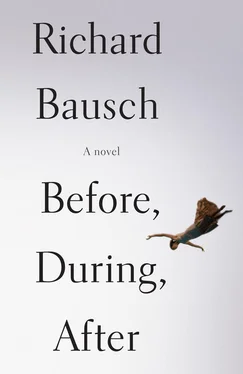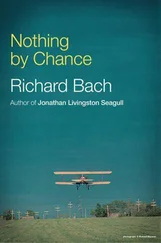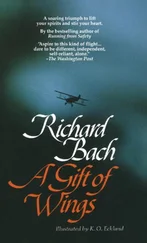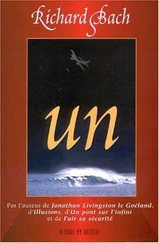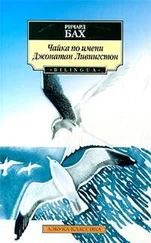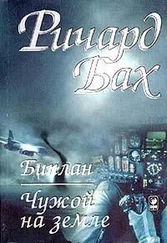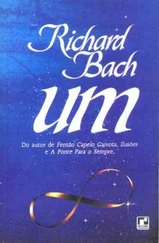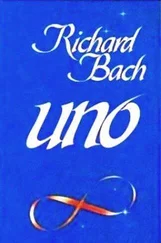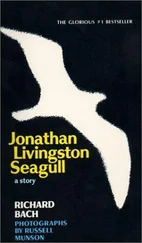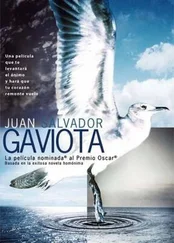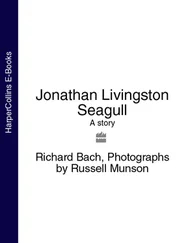“I guess you know what I — what happened,” he said to Iris, looking at Natasha and looking down again.
“I know,” Iris said to him. “Yes, I know what this girl has had to deal with.”
“I came to say — I don’t — I’m — I can’t believe I could’ve—”He halted and looked at Natasha again. “Everything. It’s my fault.”
“Come in and close the door,” Iris said. There were tears in her voice.
He took the step toward them, turned, and pushed the door shut, then faced them again, glancing at Iris and then back at Natasha and then casting his gaze back downward. His demeanor was absurd, nearly comical, that of a boy in trouble for getting wet.
“I always thought you had such a way with words,” Iris said.
He left a long silence. Then: “No.”
“Not much to say, is there.”
“Iris,” Natasha said quietly.
“I’m going to make us some breakfast,” the old woman murmured.
When she was gone, neither of them moved. Natasha still felt frightened, and he had seen it. “I’m sorry,” he said. “I–I’m so sorry.”
She waited.
“I can’t lose you. I don’t know what to do now. Can’t — can’t I do anything?”
“I don’t know.”
“I love you.”
“Right now,” she told him, “that’s hard to believe.”
“I do, I swear it. Please.” He saw the tears in her dark eyes and looked away. “Why didn’t you — why couldn’t you tell me, baby?”
His voice was so sad that for a few seconds she could not answer him.
“You were afraid?”
“No,” she breathed out. Then: “Yes.”
“If you’d told me — you know—”
“I should’ve told you,” she said.
Iris came to the opening from the kitchen. “Where did I put my cane?”
Natasha walked over and got it, and when she approached with it, Iris grabbed the frame of the door, and Natasha took hold of her. “Damn thing’s hurting again. Come in here and help me, will you? Both of you.”
Natasha walked with her, and when they were in there, they both turned. There was the empty doorway, the living room, the rainy windows. Iris nudged her toward the sink, handing the glass kettle to her.
He went to the opening and looked in at them and saw that they were working together, Iris leaning on the cane and taking things out of the refrigerator, Natasha at the sink, pouring water into the kettle.
He walked in, hesitated, and then opened the cabinet over the stove and brought out three plates and three saucers. Iris broke eggs into a bowl and whisked them and sprinkled thyme in them, and salt and broken bits of feta cheese. Faulk laid strips of bacon in the big iron skillet, and Natasha, with trembling hands, spooned coffee into the French press.
Watching him tend to the bacon, she thought, I don’t know how we’ll manage it, now, my love . She started to speak the words and then felt the tears come, turning herself away, going on with the tasks, setting the table, pouring orange juice, laying out silverware.
He wiped his wrist across his mouth, watching the bacon sizzle. To his left, Iris, pouring the eggs into another skillet, began suddenly to cry. “I’ll be better,” she said quickly, standing there with the bowl in one hand, her hip against the counter. “It’s not so strange, I guess. I’m thinking about my poor girl, my daughter. After all these years, it’s — it’s still the same pressure here.” She touched her chest.
Natasha came and put her arms around her.
He looked at them, and the whole of what they had been through moved in him under his skull, a terrible pressure.
“Please,” he said. “It’ll never come up again. Ever.”
“ What will never come up again,” his wife said. It was a challenge. And as the words came from her, she felt her own strength, her own separate being, not his, not anyone’s. Hers.
He said nothing. The helplessness in his gaze was hard to look at.
They went on with the preparation of the meal, and when it was all done they sat at the table, and Iris spooned eggs onto each plate and parceled the bacon. Natasha poured the coffee and set down the small plate of buttered toast. There was a long silence. And then Iris bowed her head and extended her hands to them.
Faulk took his wife’s hand, because this was grace; it was nearly habit.
“For what we are about to receive,” Iris said in a trembling voice. “We pray that you will make us truly thankful.”
Natasha saw the worry in his expression, the frowning anticipation. Without words, she had the rush of knowing: they were living in the new, terrible reality — war and broken expectations and suspicion and rape and masses of people dying for nothing they had done, even from a thing as harmless as the mail — and she had been frightened that she had lost him forever, and here he was, at her grandmother’s table, the family table, not lost: an essentially good man carrying the weight of his blunders and failures of faith or understanding, a man full of inconsistencies and anxiety, subject to the terrors of the time, and, withal, someone who desired to be better than that and who might even find a way to make up for the things he had done and felt out of his anguish. And perhaps, through the long and difficult and — she understood this, too — doubtful journey back, she might find again the man she had fallen in love with, the one with whom she had been so happily at ease, so much at home. The one whose child she was carrying.
“There’s something else I have to tell you,” she said.
September 7, 2007—October 6, 2012
This book was begun in Memphis; worked on and titled in Knoxville; continued in Galway, Ireland, while in the hospital with a head injury; then again in Memphis; in Ireland again; in France; and finally finished in Orange, California. Allen and Donnie Wier provided hospitality and good company throughout the composition, and my grown daughters, Emily, Maggie, and Amanda, gave nurturing and support. Lisa Cupolo was beautifully helpful through it all.
Richard Bausch is the author of twelve novels and eight volumes of short stories. He is a recipient of many awards, including the PEN/Malamud Award, a Guggenheim Fellowship, the Lila Wallace — Reader’s Digest Writers’ Award, the Literature Award of the American Academy of Arts and Letters, the Dayton Literary Peace Prize, and, in 2013, the Rea Award for the Short Story. He is currently professor of English at Chapman University in Orange, California.
